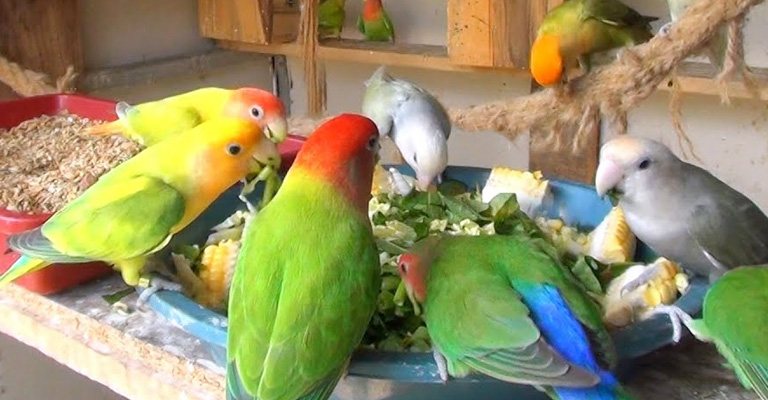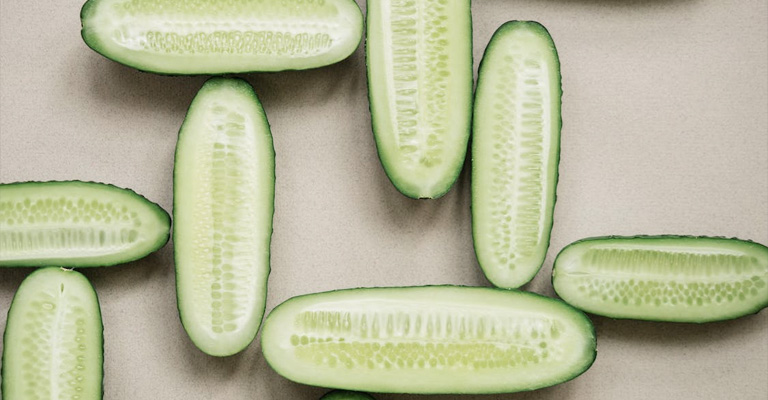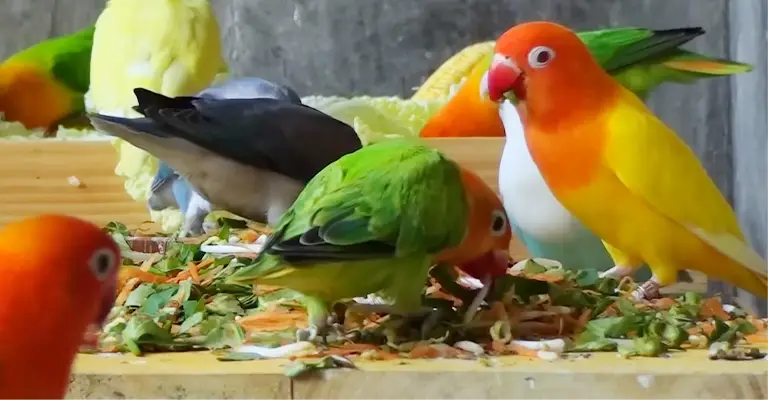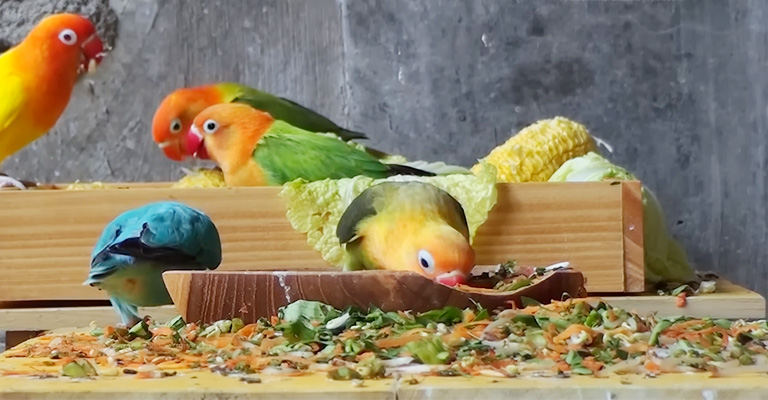Lovebirds, with their vibrant plumage and affectionate nature, make delightful companions for bird enthusiasts.
These small parrots are known for their varied diet, but many pet owners wonder, can lovebirds eat cucumbers? In this article, we’ll delve into the world of lovebird nutrition to determine if cucumbers can be a healthy and safe addition to their diet.
Lovebirds have garnered a reputation for being finicky eaters, often preferring seeds and fresh fruits. Cucumbers, being a crisp and hydrating vegetable, might seem like a tempting option.
But, as responsible pet owners, it’s essential to understand the nutritional needs and dietary preferences of our feathered friends.
Join us as we explore whether cucumbers can be a suitable treat for your beloved lovebirds, offering insights into their dietary habits and the potential benefits of introducing this garden-fresh snack.

Can Lovebirds Eat Cucumbers?
Offering cucumbers as an occasional treat can not only add variety to your lovebirds’ diet but also provide them with extra hydration, especially during hot weather.
With care, attention, and a diverse diet, you can keep your feathered companions happy, healthy, and content. Here are the details of their diet:
Lovebirds’ Diet in the Wild
Before delving into whether lovebirds can eat cucumbers, it’s essential to understand their natural diet.
Lovebirds are native to the African continent, where they inhabit a variety of habitats, including savannas, forests, and grasslands. In the wild, their diet is diverse and typically consists of:
Seeds
Lovebirds primarily feed on seeds they find in the wild. This seed-based diet is a fundamental part of their nutrition and includes a wide range of seeds, such as wild grass seeds and sunflower seeds.
Fruits
Lovebirds also consume various fruits that are readily available in their surroundings. This part of their diet may consist of berries, figs, and a selection of wild fruits, adding both flavor and additional nutrients to their nutrition.
Vegetation
Lovebirds are known to nibble on different types of vegetation. They may consume leaves, shoots, and other plant matter. Occasionally, they might even sample flower buds, adding a variety of greens to their diet.
Insects
Insects and their larvae are an essential source of protein in the lovebirds’ diet, particularly during the breeding season. This protein intake supports their reproductive efforts and overall health, contributing to their adaptability in the wild.
Understanding this diverse natural diet is crucial when considering what foods are suitable for lovebirds in captivity, including the question of whether cucumbers can be part of their diet.
Are Cucumbers Safe for Lovebirds?

Lovebirds are known for their diverse diet in the wild, but can they safely consume cucumbers in captivity? The answer is generally yes, with some important considerations to keep in mind:
Freshness
When offering cucumbers to your lovebirds, always make sure they are fresh. Inspect the cucumbers to ensure they are free from mold, rot, or pesticides.
Organic cucumbers are preferable, as they reduce the risk of pesticide exposure, which can be harmful to your avian companions.
Preparation
Lovebirds have small beaks, so it’s essential to cut the cucumbers into manageable pieces for them. Opt for smaller, bite-sized portions that are easier for your lovebirds to handle and consume.
Seedless
It’s advisable to remove the seeds from cucumbers before giving them to your lovebirds. Cucumber seeds may be challenging for them to digest and could pose a choking hazard. By providing seedless cucumber slices, you reduce this risk.
Washing
Thoroughly wash the cucumbers before serving them to your lovebirds. This helps eliminate any chemical residues and dirt that might be present on the skin. Clean cucumbers are not only healthier for your pets but also safer.
By following these guidelines, you can offer cucumbers as an occasional treat to your lovebirds, adding variety to their diet.
However, remember that cucumbers should be just a part of their diet, and it’s essential to provide a balanced and nutritionally complete diet to ensure their well-being and health.
What Are the Benefits of Offering Cucumbers to Lovebirds?

Cucumbers can be a healthy addition to your lovebirds’ diet for several reasons:
Hydration
Cucumbers are an excellent source of hydration for lovebirds due to their high water content. This is particularly important during hot weather when birds may be at risk of dehydration.
Offering cucumbers can help ensure that your feathered friends remain adequately hydrated, promoting their overall well-being.
Low in Calories
Cucumbers are a low-calorie vegetable, making them a guilt-free treat for lovebirds. You can offer these refreshing vegetables without the worry of your pets consuming excess calories. This is especially valuable in maintaining their ideal weight and preventing overeating.
Vitamins and Minerals
Cucumbers contain a range of essential vitamins and minerals, including vitamin K, vitamin C, potassium, and dietary fiber. These nutrients can be a valuable addition to your lovebirds’ diet, contributing to their overall nutrition and health.
Vitamin C, for instance, is important for their immune system, and potassium supports their bodily functions.
Variety
Introducing cucumbers to your lovebirds’ diet adds variety to their meals. Variety is crucial to prevent dietary boredom and encourage their interest in different foods.
By rotating their diet with items like cucumbers, you can keep your pets engaged and excited about mealtime, enhancing their mental and emotional well-being.
Moderation Is Key
While cucumbers can offer some benefits and serve as a refreshing treat for lovebirds, it’s important to remember that they should be given in moderation.
Lovebirds have specific dietary requirements, and their primary source of nutrition should come from high-quality commercial bird feed formulated for parrots. This ensures they receive all the essential nutrients they need to thrive.
Cucumbers should be considered an occasional treat, not a primary food source. Overfeeding cucumbers or any other single type of food can lead to imbalances in their diet and potential health issues.
As a guideline, treats like cucumbers should make up no more than 10% of their overall diet.
Observe Your Lovebirds
When introducing cucumbers or any new food to your lovebirds, it’s important to observe their reactions and preferences. Some lovebirds may take to cucumbers immediately, while others might need time to adjust to this new addition.
Always ensure that the cucumbers are well-tolerated and do not cause any adverse reactions. Some signs indicate that your lovebirds are enjoying cucumbers.
Eagerly eating the cucumber pieces. Picking up the pieces, playing with them, and tasting them. Looking engaged and curious when presented with cucumbers.
If, on the other hand, your lovebirds show disinterest or signs of aversion, it’s best to respect their preferences and not force them to eat cucumbers. Every bird has its unique tastes and dietary preferences.
Consult with an Avian Veterinarian
It’s always advisable to consult with an avian veterinarian who specializes in bird care. They can guide your lovebirds’ specific dietary needs and offer recommendations for healthy treats and supplements.
If you have concerns about your lovebirds’ diet or overall well-being, a veterinarian can address them and ensure that your feathered companions remain healthy and happy.
What Vegetables Are Good for Lovebirds?

Lovebirds are known for their vibrant plumage and affectionate nature, making them beloved companions for bird enthusiasts. To ensure the health and happiness of your feathered friends, it’s crucial to provide them with a well-rounded diet.
This includes offering a variety of vegetables as part of their nutrition. But what vegetables are good for lovebirds, and how can you incorporate them into their diet? Let’s find out!
Safe and Suitable Vegetables for Lovebirds:
Leafy Greens and Broccoli
Leafy greens are a fantastic source of essential nutrients for lovebirds. Consider offering spinach, kale, Swiss chard, and romaine lettuce. These greens are rich in vitamins A, C, and K, providing a boost to their immune system and overall health.
Broccoli is a nutrient powerhouse, containing a variety of vitamins, including vitamin C. It also provides dietary fiber, promoting healthy digestion in lovebirds.
Carrots and Bell Peppers
Carrots are a wonderful source of beta-carotene, a precursor to vitamin A. Lovebirds need vitamin A for their vision and overall well-being, making carrots a valuable addition to their diet.
Bell peppers are not only colorful but also packed with vitamin C. These vibrant vegetables can add variety to your lovebirds’ diet and stimulate their foraging behaviors, making mealtime more engaging.
Cucumbers and Zucchini
Cucumbers are a hydrating and low-calorie option that can be refreshing for lovebirds, particularly during warm weather. Just remember to follow the guidelines mentioned earlier for safe cucumber consumption.
Zucchini is an easily digestible vegetable that offers a range of vitamins and minerals, including vitamin C and potassium. It can be a valuable addition to their diet, promoting their overall health.
Celery and Peas
Celery is high in fiber and can provide a fun and crunchy element to your lovebirds’ diet. Its fibrous texture can also stimulate their beak and jaw muscles during consumption.
Green peas, whether fresh or frozen, are a great source of protein, vitamins, and minerals. They are rich in vitamin K, which is important for blood clotting and bone health in lovebirds.
Offering a variety of these safe and nutritious vegetables, along with other appropriate foods like seeds, fruits, and pellets, can help ensure that your lovebirds enjoy a balanced and satisfying diet.
Always introduce new foods gradually and observe your birds’ preferences and any adverse reactions.
FAQs
Are Cucumber Seeds Safe for Lovebirds?
Cucumber seeds can be challenging for lovebirds to digest, and they might pose a choking hazard. It’s recommended to remove the seeds from cucumbers before offering them to your lovebirds.
Can I Give Lovebirds Cucumbers with the Skin On?
Yes, you can offer cucumbers with the skin on, but it’s important to thoroughly wash them to remove any chemical residues or dirt. Organic cucumbers are a safer choice to reduce the risk of pesticide exposure.
Are Pickles or Pickled Cucumbers Safe for Lovebirds?
Pickles or pickled cucumbers are not suitable for lovebirds. They are high in salt and often contain other additives that can be harmful to birds. Stick to fresh, raw cucumbers for your avian companions.
Can Lovebirds Eat Cucumber Leaves and Stems?
Lovebirds can consume cucumber leaves and stems, but these parts are less commonly offered. Make sure the leaves and stems are free from pesticides, and consider them as occasional treats rather than primary food sources.
Are Cucumbers Beneficial for Lovebirds’ Health?
Cucumbers are hydrating and low in calories, which can benefit lovebirds, especially in hot weather. They provide some essential vitamins and minerals like vitamin K and vitamin C.
Conclusion
Cucumbers can be a safe and hydrating treat for your lovebirds when offered in moderation. These small parrots typically enjoy a varied diet of seeds, fruits, and vegetables, and cucumbers can be a healthy addition to their menu.
However, it’s essential to ensure that the cucumbers are fresh, pesticide-free, and cut into manageable pieces for your birds.
As with any dietary changes for your pets, it’s crucial to monitor their reactions and preferences. Some lovebirds may take to cucumbers immediately, while others might need time to adjust to this new addition.
Always prioritize a balanced diet that includes other essential nutrients, and consult with a veterinarian specializing in avian care for guidance on your lovebirds’ specific dietary needs.
Offering cucumbers as an occasional treat can not only add variety to your lovebirds’ diet but also provide them with extra hydration, especially during hot weather.
With care, attention, and a diverse diet, you can keep your feathered companions happy, healthy, and content.